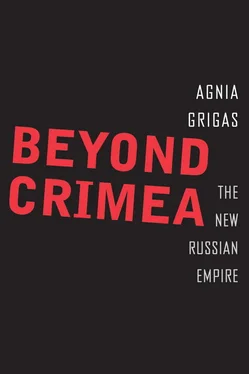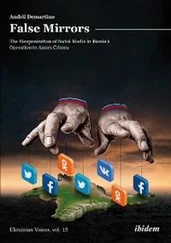In May, Putin also ordered the Foreign Ministry to develop policy guidelines toward compatriots abroad. 85These “Basic Guidelines for Support of Compatriots Abroad by the Russian Federation for 2002–2005,” approved by the government in November 2002, changed Russia’s discourse regarding the Russian diaspora. As political scientist Maria Nozhenko argues, if for the previous eight years the political establishment viewed the diaspora as a problem that Russia should tackle, now Russian speakers of the post-Soviet space were considered Russia’s external political resource to be employed vis-à-vis other states. 86As Putin stated a few months after the adoption of the document, “such ‘humanitarian’ activities [compatriot policies] mean for the interests of the country no less than the activities of Russian business abroad.” 87The Basic Guidelines called for the “initiation of their [compatriots’] role in expanding cooperation of the Russian Federation with other states and further development of democratic transformations in the Russian Federation.” 88Though the prescriptions were still in the realm of soft power, this was the first time that compatriots were officially articulated in government policies as having a role to play in Russian foreign policy.
The decade of the 2000s saw a rising momentum of utilizing compatriots in Russia’s soft power and influence efforts. As outlined in the previous chapter, the increasingly proclaimed notion of the diaspora as a “Russian World,” the spread of the Russkiy Dom network, and the establishment of the Russkiy Mir Foundation and Rossotrudnichestvo reflected Russia’s growing wealth and nationalism and the strengthening of Putin’s regime. The summer of 2008 was marked by both the Russo-Georgian war and the record peak in oil prices of US $145 per barrel. A few years earlier, in April 2005, Putin uttered his much-quoted phrase that “the collapse of the Soviet Union was a major geopolitical disaster of the century.” However, many have forgotten that in that instance the primary disaster he referenced was that of the Russian compatriots—“Tens of millions of our co-citizens and compatriots found themselves outside Russian territory.” 89Something had to be done and Moscow could finally put its money where its mouth was regarding the compatriots.
In the middle of this decade of resurrection of Russia’s power and wealth, on the occasion of the sixty-fifth anniversary of the beginning of the Great Patriotic War (the Second World War as it involved the Soviet Union) in June 2006, a presidential decree launched the “National Program of Support to Voluntary Migration of Compatriots Living Abroad to the Russian Federation.” Russia—the fair-weather friend to its compatriots—was finally going to invite them back home. However, the compatriots were not being invited solely out of good will. The program was intended to solve Russia’s evident labor shortage and related economic imbalances. 90Between 1992 and 2004 the country’s demographic situation deteriorated significantly—the excess of deaths over births reached 10.4 million and contributed to a decline in skilled human resources. 91Therefore, according to the program, compatriots would have to be settled in government-specified regions that had experienced a population decrease or labor shortages. The glitz and glamour of Moscow and St. Petersburg were not intended for Russian compatriots; instead, they would have to settle for the Far East and Siberia. 92This program of compatriot resettlement demonstrated that Russia was cynically using both the term and the people—compatriots—solely for its own immediate national interests rather than to benefit the interests of compatriots.
It was no surprise that very few Russian compatriots would take up the offer to move to the Far East or Siberia where Stalin had sent his deportees to the Gulag. In contrast to the initial plans to welcome 50,000–100,000 compatriots per year, in the peak year of 2011 only 32,500 compatriots arrived (a figure greater than in all the previous years combined). 93For instance, from Estonia in the period 2007–9, the count was only 20 to 37 repatriated persons, despite Moscow’s consistent allegations that Estonia’s Russian minority suffers various discriminations. 94The poor performance of this program can also be attributed to its much delayed launch (some fifteen years after the fall of the Soviet Union) and to the onset of the world financial crisis of 2008, affecting global labor markets. 95It is also likely that by this time most compatriots who had wanted to emigrate to Russia had already done so. Looking back, it is reasonable to question to what extent Moscow was ever sincere in its resettlement efforts, and to what extent this was merely a show for the anniversary of the Great Patriotic War. If Moscow really intended to return some Russians to the motherland, this was only a small part of a multivector strategy toward its compatriots. Just two years later in the summer of 2008, Russian tanks would be moving into Georgian territories of South Ossetia and Abkhazia, to protect local populations to whom Moscow had been dutifully offering passports in the preceding years.
Later in 2006, several programs targeting compatriots were launched, becoming long-term strategies focused on both supporting compatriots abroad and positioning them as a potential future resource. The programs also laid the groundwork for propaganda tools later used on Russian compatriots and for information warfare against Georgia, Ukraine, and beyond. The “Program for Working with Compatriots Abroad, 2006–2008” focused among other things on the provision of information support such as the creation and maintenance of websites, press publications, and TV and radio programs, collaboration with Russian-language mass media abroad. 96Putin himself underlined the importance of the program at the World Congress of Russian Compatriots in 2006, boasting that financial resources devoted to compatriot issues that year were almost seven times greater than in 2000. 97
The “Program for Working with Compatriots Abroad” has been updated three times, but it has maintained the same strategic direction. The initial 2006–8 version emphasized the improvement of compatriot legislation in Russia, while the 2009–11 version concentrated more on assistance in organizing cultural events and on the promotion of Russian media. In comparison to previous versions, the program for 2012–14, released in 2011, featured new “assistance in consolidation of compatriots on [a] professional basis” and “assistance in [the] moral encouragement of compatriots including awarding ceremonies.” 98This program also prioritized the increased role of the World Coordination Council of Russian Compatriots (established in 2006) and its country coordinating councils, as well as support for the print and internet resources of compatriot organizations. 99The latest version of the program, for 2015–17, focuses more on the younger generation of compatriots and includes a new priority of “assistance in consolidation of youth compatriot organizations” such as summer schools, international sporting events, and competitions. 100Over the past decade Russia has already engaged the Russian compatriot youth including organizing annual paramilitary camps.
Overall, unlike the efforts for repatriating the diaspora, the programs for compatriot information support have been seemingly successful. As the case studies will demonstrate, in 2014, nearly twenty-five years after the dissolution of the Soviet Union, the diaspora tends to consume Russian TV, newspapers, online news portals, and social media quite heavily across the entire post-Soviet space. However, it is difficult to determine to what extent this appeal is due to the diaspora’s self-identification with Russia rather than with the significant advantages of scale and financing enjoyed by the Russian media versus the more limited media offerings of the smaller former Soviet republics.
Читать дальше












